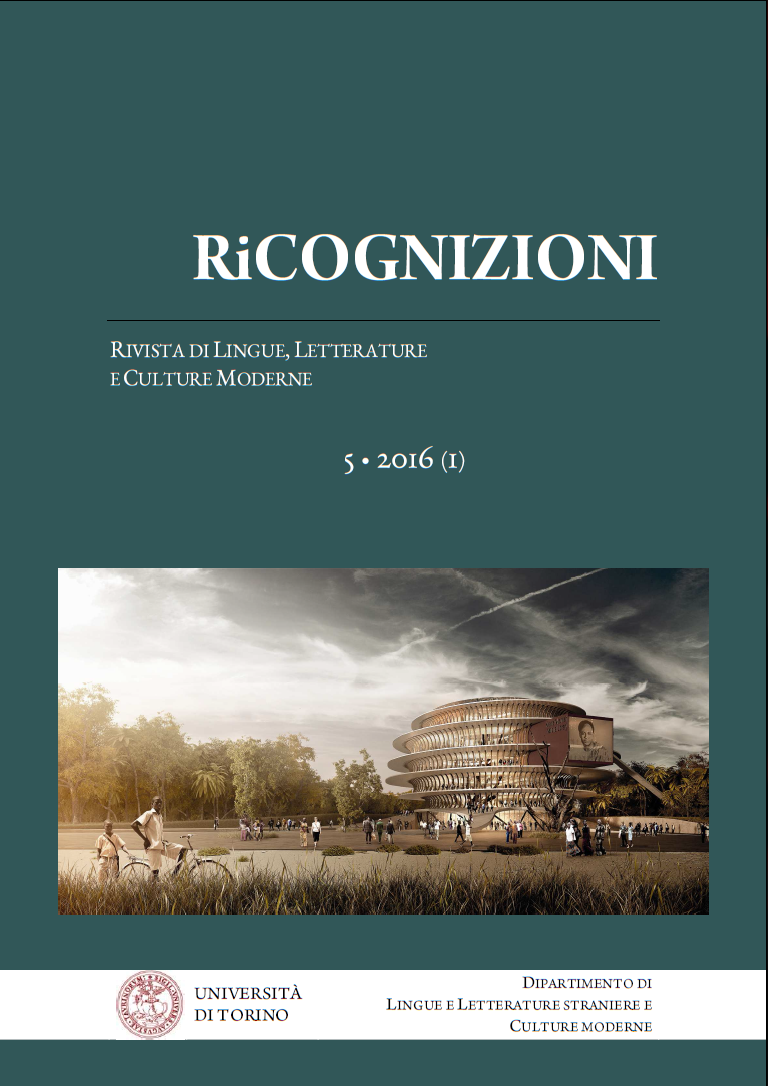SECRET THINKER SOMETIMES LISTENING ALOUD: SOCIAL COMMITMENT IN DAVID BOWIE’S LYRICS
DOI:
https://doi.org/10.13135/2384-8987/1687Parole chiave:
Bowie, music, realism, postmodernism, Sillitoe, WaterhouseAbstract
This article analyses David Bowie’s lyrics emphasizing their social commitment ad their concern for history’s dispossessed. It first focuses on some songs from the album Scary Monsters (and Super Creeps) (1980) and then moves to later songs from the 1980s and 1990s; finally, it looks back on Bowie’s beginnings and the more narrative compositions of that period, where he was influenced by working-class writers such as Alan Sillitoe and Keith Waterhouse. This aspect of Bowie’s output is often neglected by scholars, unlike his iconic stature as a gender-bender and the postmodern, fragmentary quality of his lyrics revolving on inauthenticity. I here argue that his social commitment, far from clashing with his postmodern style, exemplifies how constructedness can work as an instrument of political criticism. With regard to this, the present article makes use of Maurizio Ferraris’s category of New Realism and its criticism of the reactionary parable followed by postmodern paradigms.Riferimenti bibliografici
Adinolfi, F. (2016), La pop star caduta sulla terra, in “Il manifesto”, 12 January: p. 8.
Bowie, D. (1967), “There Is a Happy Land”, “Little Bombardier”, in David Bowie (Deram).
------------ (1969), “Space Oddity”, “Wild Eyed Boy from Freecloud”, “God Knows I’m Good”, in Space Oddity (Philips).
------------ (1971), “Changes”, in Hunky Dory (RCA).
------------ (1972), “Starman”, “Lady Stardust”, Rock’n’Roll Suicide”, in The Rise and Fall of Ziggy Stardust and the Spiders from Mars (RCA).
------------ (1974), “Rebel Rebel”, in Diamond Dogs (RCA).
------------ (1975), “Young Americans”, “Win”, in Young Americans (RCA).
------------ (1976), “TVC15”, in Station to Station (RCA).
------------ (1980), “It’s No Game (Part 1)”, “Up the Hill Backwards”, “Ashes to Ashes”, “Scream Like a Baby”, “It’s No Game (Part 2)”, in Scary Monsters (and Super Creeps) (RCA).
------------ (with Queen) (1981), “Under Pressure” (EMI).
------------ (1983), “Let’s Dance”, “Ricochet”, in Let’s Dance (EMI).
------------ (1987), “Day-In Day-Out”, in Never Let Me Down (EMI).
------------ (with Tin Machine) (1989), “I Can’t Read”, “Working Class Hero”, in Tin Machine (EMI).
------------ (1997), “Dead Man Walking”, in Earthling (RCA).
Broackes, V., Marsh, G. (eds and curators) (2013), David Bowie Is, London, V&A.
Buckley, D. (2015), Revisiting Bowie’s Berlin, in E. Devereux, A. Dillane, M.J. Power (eds), pp. 215-29.
Chambers, I. (2015), Musica come metodo, in Martino (ed.), Words and Music. Studi sui rapporti tra letteratura e musica in ambito anglofono, Rome, Armando: pp. 25-32.
Critchley, S. (2014), Bowie, New York and London, OR Books, illustrations by E. Hanson.
Delbono, P. (2016), David Bowie. L’uomo che cadde sulla terra, Florence, Clichy.
Devereux, E., Dillane, A., Power, M.J. (2015), David Bowie. Critical Perspectives, New York and London, Routledge.
Donadio, F. (2016), David Bowie, Fantastic Voyage. Testi commentati [2013], Rome, Arcana.
Eagleton, T. (1996), The Illusions of Postmodernism, Oxford, Blackwell.
Ferraris, M., 2015, Manifesto of New Realism [2012], foreword G. Harman, trans. S. De Sanctis, Albany, SUNY Press.
Fitch, R. (2015), In This Age of Grand Allusion. Bowie, Nihilism and Meaning, in E. Devereux, A. Dillane, M.J. Power (eds): pp. 19-34.
Frayling, C., Hoare, P., Kermode, M., Marsh, G. (2013), David Bowie Then… David Bowie Now…, in V. Broackes, G. Marsh (eds): pp. 282-300.
Kureishi, H. (2015), Novelist Hanif Kureishi on David Bowie’s “Rebel Rebel”, in “Wall Street Journal”, March 17, http://www.wsj.com/articles/novelist-hanif-kureishi-on-david-bowies-rebel-rebel-1426600595 (last access: 20 May 2016).
Marsh, G. (2013), Astronaut of Inner Spaces: Sundridge Park, Soho, London… Mars, in Broackley and Marsh (eds): pp. 26-46.
Martino, P. (2015). Note sui rapporti tra letteratura e musica in ambito anglofono, in Martino (ed.), Words and Music: Studi sui rapporti tra letteratura e musica in ambito anglofono, Rome, Armando: pp. 7-23.
----------- (2016), La musica come teatro. David Bowie creatore di nuove estetiche e sperimentatore estremo, in “L’indice dei libri del mese”, XXXIII/4: p. 7.
Pegg, N. (2005). The Complete David Bowie [2000], trans. C. Mapello, M. Musi, A. Arduini, Rome, Arcana.
Roeg, N. (1976), The Man Who Fell to Earth (British Lion Film, Cinema 5).
Scarlini, L. (2016), Ziggy Stardust. La vera natura dei sogni, Turin, add.
Scholes, R. (1985), Textual Power. Literary Theory and the Teaching of English, New Haven and London, Yale UP
Shaw, D. (2016), David Bowie. Verbatim, in Seriously…, BBC Radio Four 30 January, bbc.co.uk/programmes/articles/1WR4vjROdbQgGnrpPpLHKqf/david-bowie-in-his-own-words (last access: 1 February 2016).
Sillitoe, A. (1995), Uncle Ernest [1959], in Collected Stories, London, Flamingo: pp. 37-46.
Usher, B., Fremaux, S., (2015), Turn Myself to Face Me. David Bowie in the 1990s and the Discovery of Authentic Self, in E. Devereux, A. Dillane, M.J. Power (eds): pp. 56-81.
Waldrep, S. (2015), The ‘China Girl’ Problem. Reconsidering David Bowie in the 1980s, in E. Devereux, A. Dillane, M.J. Power (eds): pp. 147-59.
Waterhouse, K. (1962), There Is a Happy Land [1957], Harmondsworth, Penguin.
##submission.downloads##
Pubblicato
Come citare
Fascicolo
Sezione
Licenza
Gli autori che pubblicano su questa rivista accettano le seguenti condizioni:- Gli autori mantengono i diritti sulla loro opera e cedono alla rivista il diritto di prima pubblicazione dell'opera, contemporaneamente licenziata sotto una Licenza Creative Commons - Attribuzione che permette ad altri di condividere l'opera indicando la paternità intellettuale e la prima pubblicazione su questa rivista.
- Gli autori possono aderire ad altri accordi di licenza non esclusiva per la distribuzione della versione dell'opera pubblicata (es. depositarla in un archivio istituzionale o pubblicarla in una monografia), a patto di indicare che la prima pubblicazione è avvenuta su questa rivista.
- Gli autori possono diffondere la loro opera online (es. in repository istituzionali o nel loro sito web) prima e durante il processo di submission, poiché può portare a scambi produttivi e aumentare le citazioni dell'opera pubblicata (Vedi The Effect of Open Access).









